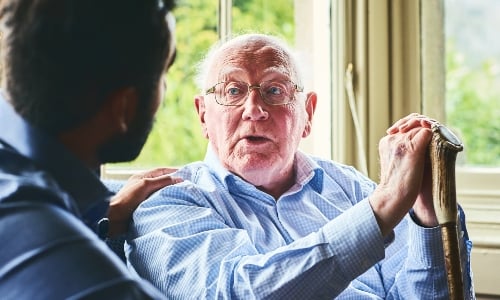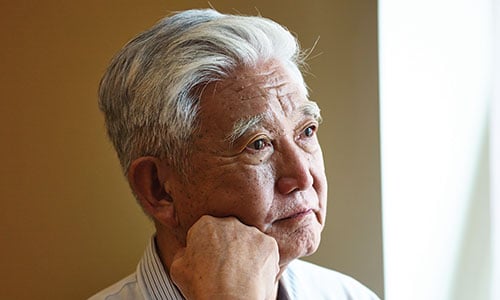This week (14th-18th May) is Dying Matters Week, a campaign to raise awareness of the importance of talking about dying, death and bereavement.
We all seem to find it difficult to have conversations with people we love about death and dying. It brings up uncomfortable emotions so we tend to shy away from it.
Talking about death often feels like a taboo subject in our society.
Yet all of us will experience the death of a loved one at some point in our lives and talking more openly can often make it seem less scary.
Age UK, together with the Malnutrition Task Force, have produced a booklet and short film to encourage us all to feel more confident about having these difficult conversations.
We know from our research that over a third (36%) of people aren’t comfortable bringing the subject up with a relative or close friend and 40% don’t know their loved ones wishes around dying (such as what their preferred type of burial might be).
We also know that older people often feel more able to have conversations with their peers than with their younger friends and relatives.
We hear from people who have experienced a death that they felt unprepared about what to expect. They wish that they had better understood the physical changes that can happen as someone nears death and had been able to have more open conversations with the person dying, their family and friends. People tell us that they didn’t know what questions they should be asking health care professionals or the person dying, about practical or emotional issues related to their death.
Why is it important to talk?
Often, we only start asking questions in the final days of someone’s life – we might try to ignore what’s happening until death is very close – but starting conversations early is really important to allow time for everyone to talk openly and honestly.
Being able to talk gives us all the opportunity to share any worries, fears or wishes that we have.
We can discuss in our own time and in ways that we know our loved ones will understand about dying, our own death, their death, being with someone when they die, asking what they want and knowing what to expect and what to do.
It’s also important to involve children in these conversations. Coping with death is an intergenerational challenge and something that affects us all.
Having these conversations gives the opportunity to prompt so that wills are prepared and finances settled, and other wishes can be discussed, for example, around life support machines, organ donation, cremation, burial or about what kind of send-off we would like.
Talking with our loved ones about their worries, fears or wishes helps us have the knowledge and ability to ask the right questions to health care professionals and if need be, to challenge the care and support of a loved one who is dying.
How we can help
We know that people often feel worried about starting conversations that they may upset or offend others. We might be frightened about what we may hear and anxious that we may not be able to handle our emotions, or feel awkward about mentioning important personal issues such as toilets and keeping clean. But it’s likely that if you’re feeling something, others are too.
Our booklet, ‘Let’s talk about death and dying,’ is designed to help start these difficult conversations. To help everyone feel empowered and confident to talk about death, to ask questions of each other, to listen, to be sure what all of our loved ones would like to happen when death comes.
There are no right or wrong ways to start a conversation – it will be different for everyone – but we hope this book will encourage us all to start talking about death and dying.
View our resources to find out more about how to talk about death and dying








